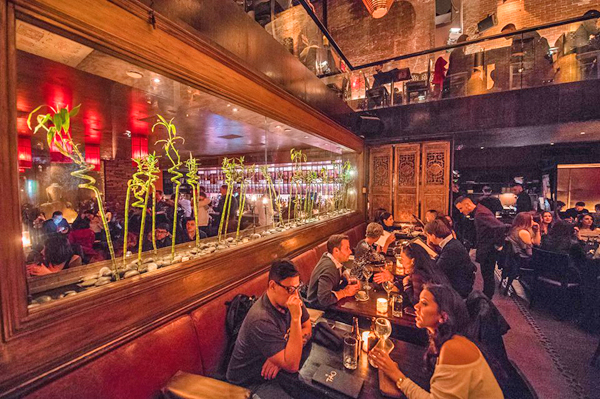


I feel like we are wandering through an ancient temple,įollowing our guide to revelations unknown. My eyes adjust to the darkness as the hostess leads us to

I would have loved Tao Uptown in my own single-urban-professional years.
#RESTAURANTS LIKE TAO NYC FULL#
I briefly reflect on our choice as we enter the dimly lit restaurant and I peek into the cocktail lounge full of well-clad sophisticates yakking it up over martinis. This post may contain affiliate links in which the Bashful Adventurer earns a small commission if you click on the link and make a purchase from the site. But will this be an appropriate place for a mommy-and-me dinner or will the restaurant be chock full of urbanites prowling for adventures of their own?
#RESTAURANTS LIKE TAO NYC PROFESSIONAL#
In search of upscale Asian food in midtown Manhattan, I check out Tao Uptown restaurant on the advice of (and, indeed, with) the Youthful Adventurer, who happens to be a twenty-something professional now. Janice Endresen is an editor for the Cornell SC Johnson College of Business.(Last Updated On: October 23, 2019) Buddha looms large in the dining room at Tao Uptown restaurant in New York City. “Consequently, it’s vital to understand the factors that underlie and influence business competition and performance.” “As the late food writer and critic Anthony Bourdain put it, ‘Food is everything we are ,’” Greenberg said. Ratings are valuable in helping consumers make choices they also have implications for business performance that impact all stakeholders in a business. “The bottom line is that to compete in a fragmented and competitive market like the restaurant market, owners and managers must be attuned to the nuances and codes of rating platforms.” That’s how you make money,’” Greenberg said. “One New York City restaurateur we interviewed reflected on the increased importance of receiving and maintaining favorable ratings, saying: ‘It’s not about ego. It also underscores the importance of tuning into the nuanced information those consumers seek and need. This research is valuable for restaurant owners and managers because it identifies consumers who seek, and are influenced by, ratings platforms as tourists and consumers of the highest-cost restaurants, Greenberg said. Greenberg’s approach was to apply for and gain access to restricted-access government data that included private companies’ sales information. “I also acquired paper copies of Zagat guides on eBay and Amazon and then digitized those ratings so that I could have a continuous timeseries of ratings that goes back to 1994, before the advent and expansion of online rating platforms,” he said. They also needed performance measures for thousands of private businesses. To discern and measure the impact of internet-enabled rating platforms on restaurant performance, Greenberg and fellow researchers set out to gather continuous ratings information both before and after the proliferation of digital rating platforms. In turn, consumer choices based on these platforms impacts comparative business performance and all that entails for the businesses and their workers.” “Rating platforms help provide this information. “ When we look for a place to eat – particularly for a special or high-cost meal – we want to know if the meal and experience will be good,” he said. Tourists, on the other hand, lack this firsthand information, so they must rely on rating platforms to inform their choices. Consequently, they are less reliant on rating platforms. Locals have firsthand information and experience with restaurants in their area, so they know the nuances of different offerings, Greenberg said. The paper was co-authored with New York University Stern School of Business faculty Gino Cattani and Joe Porac and former Stern doctoral student Daniel Sands, now of University College London. Greenberg co-authored the paper, “ Rating Systems and Increased Heterogeneity in Firm Performance: Evidence From the New York City Restaurant Industry, 1994-2013 ,” published Aug. “In neighborhoods frequented by ‘locals,’ the advent and expansion of internet-based ratings platforms did not result in greater disparities in restaurant sales despite how ubiquitous they are and how frequently we anecdotally use them,” said Jason Greenberg, associate professor of management and organizations at the Peter and Stephanie Nolan School of Hotel Administration in the Cornell SC Johnson College of Business. Ratings on platforms such as Yelp and TripAdvisor can greatly impact high-priced New York City restaurants that service tourists, but have less of an effect on restaurants frequented by “locals” outside of tourist areas, according to new Cornell research.


 0 kommentar(er)
0 kommentar(er)
